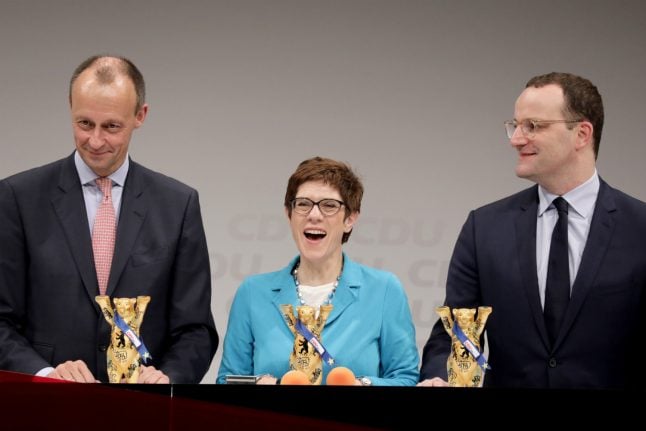Merkel ally: 'AKK'
 Annegret Kramp-Karrenbauer during the CDU regional conferences. Photo: DPA
Annegret Kramp-Karrenbauer during the CDU regional conferences. Photo: DPA
Known as a strong ally of the chancellor, 56-year-old Annegret Kramp-Karrenbauer is the former premier of Germany's tiny Saarland state. She is a loyal follower of the chancellor's centrist line that has shaped the CDU and German politics over the past two decades.
At Merkel's initiative, she became party General Secretary in February, the number two spot offering a leg-up towards taking the helm.
Often referred to by her initials “AKK”, her Catholic views overlap more with the conservative wing of the CDU than Merkel's on social questions such as abortion or gay marriage.
She has also criticized some aspects of Merkel's border policy, so she's not a cardboard cut out of the chancellor.
Throughout the campaign AKK has played up her long experience in office and her history of winning regional elections, a marked contrast with her two male competitors.
Polls show Kramp-Karrenbauer is the most popular candidate for average voters — but it is unknown what weight this will carry among the 1,001 CDU delegates who will vote in Hamburg on Friday.
SEE ALSO: Survey: Kramp Karrenbauer top choice to replace Merkel as leader
SEE ALSO: 'Anti-Merkel' convinced he can take spot in CDU leadership race
Fresh-faced underdog: Jens Spahn

Jens Spahn. Photo: DPA
Jens Spahn, a hardliner on immigration, is seen by many as the underdog. At 38 years old he's the youngest of the frontrunners, and is also a fierce critic of Merkel.
The chancellor named Spahn as health minister in her fourth government to appease the CDU's conservatives, but he hasn't held back from attacking what he sees as her overly “Social Democratic” party line.
As health minister Spahn has already made his mark, speaking out on issues such as organ donation, which he has suggested should be an opt-out system in Germany, rather than opt-in. And he's also spoken out about insurance contributions, saying that people without children should pay more to help keep the system afloat.
He has sharpened his profile through meetings with right-wing darlings like Austrian Chancellor Sebastian Kurz and US ambassador to Berlin Richard Grenell, a prominent supporter of President Donald Trump.
A picture of Grenell and Spahn posing with their respective spouses after a casual dinner in Berlin made headlines in Germany.
But many see the leadership contest as having come too early for the ambitious minister, who has seen supporters desert him in favour of Friedrich Merz despite his attempts to strike a tough tone on migration.
SEE ALSO: Meet the gay rights champion gunning for Merkel's job from the right wing of her party
SEE ALSO: Germany looks beyond Merkel as party prepares to elect successor
Avenger: Friedrich Merz

Friedrich Merz during the CDU regional conferences. Photo: DPA
Corporate lawyer Friedrich Merz, 63, has never forgiven the chancellor for driving him out as head of the party's group of MPs in the Bundestag in 2002.
Like Spahn, financial policy expert and social conservative Merz has complained that Merkel led the CDU too far to the left.
He quit the Bundestag following his defeat at her hands, returning to work as a lawyer and heading the supervisory board of mammoth asset manager BlackRock's German arm.
Merz has been dubbed the 'anti-Merkel' due to his completely different style of politics and delivery as compared to the chancellor.
While he is the clear favourite of pro-business forces in the party and has drawn conservatives away from Spahn with a promise to “halve” the vote share of far-right Alternative for Germany (AfD), gaffes have marred his campaign.
Early on, he described himself as a member of the “upper middle class” — only to admit soon after that he earns around one million euros per year.
And he was widely criticized for a suggestion to weaken the constitutional right to asylum in the wake of the 2015-16 refugee influx that has shaken German politics under Merkel.
SEE ALSO: 'I can win back AfD voters': CDU leadership candidate hoping for Merkel's job
SEE ALSO: End of an era: What you need to know about Merkel's planned departure




 Please whitelist us to continue reading.
Please whitelist us to continue reading.
Member comments